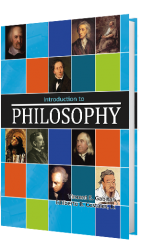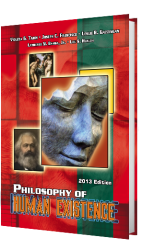-

A Reflection Manual on Philosophy of the Human Person (Placido)
Authors: Dennis M. Placido, Charlie M. Dagwasi, Shierwin A. Cabunilas, Asisclo M. Abonado III
Philosophy is life. It is a search for meaningful existence. It is mapping out our way towards meaningful and significant existence. It aims to clarify our human understanding of anything, including ourselves. It is from these claims that this workbook, A Reflection Manual on Philosophy of Man is intended: to make that way of life realizable in the context of college students. The method in philosophizing and in the understanding of the human person is activity-driven that involves understanding by doing.
Since philosophy is art itself, the tools for understanding include seeing, reflecting and acting. Since the workbook is thematic, each theme involves the three tools: seeing involves the observations, the phenomena, or the raw experiences that provoke some inquiries in understanding better our humanity; reflecting includes integrating and clarifying the experiences within philosophical insights regarding the human person; and acting entails the creating of personal insights regarding the judgment drawn from seeing and reflection. The act part involves a personal contribution to the enrichment of understanding the human person.
Philosophy is also the love and pursuit of wisdom. As such, the method employed in this workbook is phenomenological in the sense that it intends to present being as the underlying reality in human consciousness. It presents a description of the phenomenon of the human world, yet hermeneutically analyzed within the context of philosophical reflections. The study of the human person is critical and reflective on the human person's nature and unique existence. It provides foundations for a deeper understanding of what and who the human person is, and what it means to be fully human.
The workbook is geared to accomplish several general objectives: First, it aims to introduce the students to the different perspectives about the human reality; it also aims to enable the students to cultivate the habit of critical thinking and free inquiry on the human person; 3) (It is also) to integrate the student's learning of the human person in other disciplines and at the same time to enable the students to attain a profound understanding about their human experiences. The students are also given the opportunity to analyze and reflect on philosophical insights through reading philosophical texts; and, (4) finally the workbook aims to develop in the students the skills of critical thinking through writing their philosophical insights about the human person.
By using the workbook, students are geared to attain these competencies: a) understanding various views on the human person and their implications; b) an informed perspective on the human person; c) improved verbal and written skills in constructing arguments; and d) a disciplined approach, through research, in discussing issues hounding human existence.
The workbook thematically addresses the human project regarding: human becoming, freedom, transcendence, egoity, embodiedness, cognition, having, sociality, language, alienation, conscience, commitment, belief and religion, love, art and creativity, suffering and death, being and hope; all of which are geared towards a better understanding of our humanity. After each topic, discussion questions are provided to deepen our seeing-reflecting-acting process.
-

Introduction to Philosophy (Gabitan)
Authors: Vincent E. Gabitan, Edilberto B. Costales, Jr.
The aim of education is to develop morally and physical-1j) of the masses; to guide them into a prosperous, intelligent and noble people “
— Dr. Jose Rizal
As it is the wish and willful desire of every human being to attain education, it is the desire as well of the protagonists of this textbook to attain education that is valid and sound. An education that is acceptable not only in this part of the city but as well as nationally and globally.
Apparently, this textbook ventures into learning what is logical and sound education. This provides not only knowledge, for knowledge can easily be obsolete because of the rapid changes of the waves of time brought by the fast pace of scientific investigation and experimentation, and the constant evolution of technological gadgets, but also critical thinking skills that enable the students to understand recent information or knowledge, so that they will be able to cope with the trend of this era which is clarifying that if one is not aware of what is valid and invalid reasoning, his beliefs and principles will easily be manipulated.
This likewise optimistically facilitates the students in acquiring basic skills in reasoning, communication, and appreciation of the various disciplines in philosophy; and lastly, this subject facilitates students to think the way a Filipino thinks. Thus, they will be able to develop a sense of nationalism and patriotism.
All the above goals are indeed under the umbrella of philosophy. Thus, this subject provides an introduction to philosophy with ample emphasis on the basic concepts in Logic.
-

Philosophy of Human Existence 2013 (Tabin)
Authors: Violeta G. Tabin, Joseph C. Francisco, Leslie B. Gazzingan, Lamberto M. Bamba, Jr., Lou S. Hualda
Whenever one asks a student about his/her concept of the word philosophy, one would hear the answer that it is 'difficult,' that there is no relationship with one's course, or it is about pilosopong tasyo wherein one engages himself/herself in an argument that is unsubstantial. Hence, to change this concept in the mind of an individual, the authors have conic up with a textbook that is more student-friendly with the hope that it will help open the minds of an individual to become aware of, realize and appreciate, philosophy as part of one's existence.
The book, Philosophy of Human Existence, is a result of the collaborative effort of the authors to produce a more simplified college textbook on this subject. The book is divided into three parts: Part I — Philosophy of Man and Its Beginnings, which covers the Meaning of Philosophy and Its Branches and Purpose; Part II — Human Person in Relation to His World and His God, which covers Man as He Co-exists with Others and Moral Views on Human Person in the Context of Christian Philosophy; Part III — Issues Related to Human Equality and Relationship, which covers Domestic Violence, Violence Towards Self and Others, and National and International Violence.
The method in studying the nature of man shall be a presentation of the different and varied views or philosophies on the human person. From Western philosophies to Eastern philosophies, and with different ideologies, such as atheists' views, the student's own ideology or philosophy will be challenged using his/her own critical thinking. The Christian philosophy on the nature and condition of man shall be presented as well. Finally, issues and problems on human as he/she relates with his world .and others, both national and international shall also be presented for discussion,
